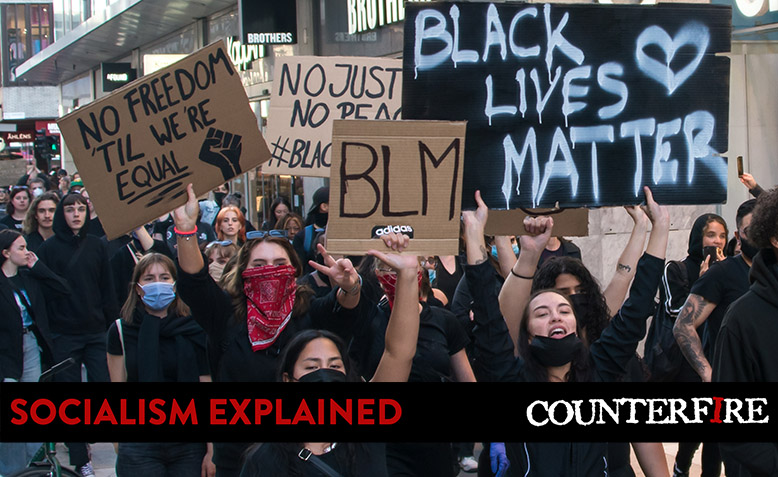 Black Lives Matter protest. Photo: Frankie Fouganthin / Wikimedia Commons / CC BY-SA 4.0, license linked below article
Black Lives Matter protest. Photo: Frankie Fouganthin / Wikimedia Commons / CC BY-SA 4.0, license linked below article
Yonas Makoni explains the socialist perspective on where racism comes from and how we can eradicate it
Martin Luther King once said that ‘the arc of the moral universe is long, but it bends toward justice.’ This unqualified optimism about the possibility of eradicating racism seems hard to fathom today. The refrain ‘nothing has changed’ has become increasingly common within the anti-racist movement, reflecting widespread frustration and anger over the lack of progress on racial disparities.
While such statements are useful in some instances, they can also lead to an unproductive pessimism, to the belief that nothing has changed because nothing can change. In order to rekindle MLK’s sense of optimism, it might be useful to ask where racism actually comes from and what that means for the fight against it.
The difference between socialists and liberals on racism can be, in many ways, boiled down to the question of from where racism comes. For liberals, racism is defined primarily as an aggregate of bad or misinformed opinions, attitudes or biases. Tackling racism is, as such, primarily a matter of changing minds through education or social pressure. Similar to charity fundraising or individualised approaches to combating climate change, this conception believes in stimulating fundamental change by making people feel bad. Not for nothing, it usually leads to pessimism.
For socialists, racism comes from the top, from the seats of power. If racism persists, this is because the institutional structures that produce it still exist. Just as with climate change, this conception allows us to understand that, while individual beliefs and habits are important and certainly should change, they are not the determining factor.
Those in power do not promote racism out of malice, but because the logic of the system they are upholding drives them to it. The needs of competition drives capitalists, on the one hand, to incessantly intensify the exploitation of the workforce and to seek new opportunities for profiteering, triggering working-class resistance.
Politicians, on the other hand, are tasked with promoting this capitalist expansion, while containing its destabilising effect. A series of constraints force politicians into this dilemma. Firstly, since the state functions to maintain social stability, it must avoid economic crises by all means and convince capitalists that the country is a safe place to do business. Secondly, capitalist interests positively shape policy in numerous ways: through lobbying, candidate selection, media pressure and so on.
Racism provides a clever way out here. Firstly, it allows capitalists to intensify their exploitation of the working class without undermining social stability, since it pits one group of workers against another. Institutional racism thus forces ethnic minorities and migrants into precarity, forcing them into jobs with much lower pay and worse conditions. But this super-exploitation of minorities also creates a downward pressure on the standards and bargaining power of the working class as a whole.
On the other hand, it also allows politicians to reconcile this protection of capitalist interests with their task of maintaining national cohesion. Particularly in times of crisis, it allows them to sustain cross-class, political coalitions by redirecting popular anger towards minorities, scapegoating them for society’s hardships.
But to focus only on why and how racism works is one-sided, because it neglects the countervailing forces. In its tendency to intensify the exploitation of all workers, capitalism not only divides the working class but also creates a basis for class unity. As we can see from the history of anti-racist and working-class movements, there have been many times in which racist division has been overcome and workers have learnt the necessity of unity in pursuit of their common interests. However, to succeed in the long term, these movements must transform the economic and political structures that seek to divide them.
By isolating the role that racism plays in the economic and political context, we treat it as something that is historically situated and therefore not eternal. If it is not eternal, it can be overcome. But it also rules out half measures. To defeat racism, we need to also defeat the forces that rely on it.
Fund the fightback
We urgently need stronger socialist organisation to push for the widest possible resistance and put the case for change. Please donate generously to this year’s Counterfire appeal and help us meet our £25,000 target as fast as possible.

